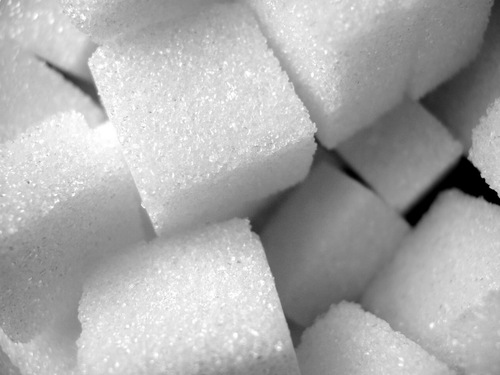It has been known for decades that sugar consumption doesn’t correlate with the onset of type 2 diabetes later in life (after controlling for BMI). So anyone proposing dietary theories where metabolic syndrome is caused by “pancreatic stress due to sugar consumption” has a mechanism in their model that has long been discredited.
All the large-scale longitudinal studies, including the Health Professionals Study and the Nurses’ Health Study have enough data to bury this theory so badly, that proposing it again is strictly an availablity error. Also, the Melbourne Collaborative study (n=36,787) showed that sugar intake was actually protective against diabetes later in life. So what’s going on here?
The Randle cycle is at least something that’s not ruled out by science. It’s the theory that fatty acids from deep fat stores out-compete sugars in the blood stream that are trying to be metabolized. In this model, the problem isn’t the sugar consumption. It’s the sugar consumption by someone whose blood concentartion of fatty acids is already way too high (at all times) due to being overweight.
To put this in perspective: If you thought eating lots of sugar reliably leads to type 2 diabetes, your model would be analogous to someone who thought lots of driving reliably leads to drunk driving accidents.
See on paleodietnews.com









7 Responses to “What If Sugar Doesn’t Cause Diabetes?”
December 2
Andrew Hay… but does sugar consumption correlate with BMI? correct me if I’m wrong but are you not saying that, two people with the same weight (well, BMI) one eats sugar and one does not will have the same risk of type 2 diabetes?
December 2
Scott Fowler“sugar consumption doesn’t correlate with the onset of type 2 diabetes later in life (after controlling for BMI)”
True but inconsequential. Sugar consumption demonstrably aids in increasing BMI. You might as well say house fires don’t correlate with deaths (after controlling for temperature).
December 2
Louie HelmHaving too many calories (from any source) aids in increasing BMI. Bread or meat is just as bad as sugar on a per calorie basis for increasing weight. There’s nothing particularly special about sugar to single it out.
December 2
Gregory SizemoreAs I understand, sweet tasting things are a factor in food reward, which is very important for regulating weight.
December 2
Andrew HayThe problem with the article is that when it says ‘glucose’ it can mean only ‘blood glucose’. Saying that “Bread or meat is just as bad as sugar on a *per calorie* basis for increasing weight” is the conventional but naive view. Carbs and fat are dealt with in completely different metabolic ways (proteins as well).
For example simple carbs like sugar do indeed go straight into the blood as ‘blood glucose’, but most of them are converted to fatty acids in the liver! Besides, burning glucose in adipose tissues increases the retention of fatty acids inside the fat cells, ultimately leading to overweight – insulin directly affects this. I could go on.
As for the Randle cycle, it’s hard to see how it fits in with this but from the wiki article states “This cycle adds a nutrient-mediated fine tuning on top of the more coarse hormonal control on fuel metabolism.”. Which implies it is still not the major decider about what fuel a cell uses, a ‘fine tuner’. But I don’t have strong opinions on this.
December 2
Scott FowlerMy understanding of diabetes is that your body can handle glucose normally, you first need to break your body’s ability to respond properly to glucose (usually by being excessively overweight, occasionally by having type one diabetes) and *then* overconsume glucose. I think that fits with this article; the suggestion of the Randle cycle as the mechanism for how being overweight breaks your body’s response to glucose is an interesting one; the mechanism I’d heard was a feedback loop of insulin receptor downregulation causing increased insulin production which causes more receptor downregulation.
December 14
Duff McDuffeeDoesn’t excess sugar consumption cause weight gain though?
EDIT: From the article:
“If you feed lab animals high doses of polyunsaturated fat (either omega-6 or omega-3 will do) along with high doses of either fructose or alcohol, then fatty liver disease develops along with metabolic syndrome.”
Ok, so sugar is still a cause, just one of many. Add in alcohol and potato chips and you got yourself a killer cocktail.